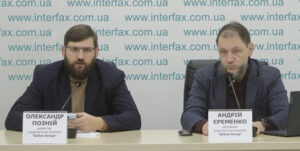
Personnel reshuffles initiated by the President of Ukraine at the start of 2026 are perceived by society with restraint: amid high awareness, Ukrainians more often speak of cautious hope than of a feeling of real renewal of power, according to the results of a nationwide survey by the research company Active Group.
According to the published data, 79.2% of respondents reported that they had heard about the personnel changes, and another 14.8% noted that they “had heard something but are not sure about the details.” 6.0% of those surveyed learned about these decisions for the first time – thus, the overall level of awareness exceeds 94%.
At the same time, assessments of the consequences of the personnel changes remain uncertain: 43.6% of respondents believe that these decisions brought more benefit to the country, 18.3% – more harm, and almost 38.0% were unable to give an unambiguous answer.
The founder of the sociological company Active Group, Andrii Yeremenko, commenting on the survey results, noted that the recorded high awareness of the personnel decisions did not transform into a formed assessment of their consequences.

“We see a situation where more than 94% of respondents have at least heard about these appointments, but almost 38% cannot say whether this is more benefit or harm. This means that society currently does not have sufficiently clear markers of effectiveness – people expect practical results, not signals of a ‘reset’ at the level of personalities. The distribution of answers regarding the ‘renewal of power’ almost equally additionally confirms that there is a demand for change, but it is tied to governance logic and the implementation of decisions, not to the very fact of personnel replacements,” Yeremenko emphasized.
When asked whether the decisions of recent weeks can be considered a renewal of power, 42.5% answered in the affirmative, while 46.7% answered negatively. In the emotional dimension, 52.1% of respondents stated that the personnel reshuffles give more hope, while 29.1% said that disillusionment prevails; at the same time, 10.2% feel “only hope.”
Among the areas of state policy that, in respondents’ opinion, may be strengthened as a result of the appointments, foreign policy, diplomacy and the negotiating track were most often named: 41.5% expect strengthening, 13.2% – weakening. Regarding the defense of the state, 39.0% forecast strengthening, 20.5% – weakening. For a number of domestic areas – social policy, the economy, the work of law enforcement agencies and the fight against corruption – restrained or negative expectations prevail, while a significant share of “hard to say” answers remains.
Assessing the impact of personnel decisions on trust in key officials, most respondents report no changes. In particular, regarding President Volodymyr Zelensky, 63.8% noted that the level of trust did not change, 17.5% speak of an increase in trust, and 13.5% – of a decrease. Regarding Kyrylo Budanov, 54.5% did not feel changes, 24.0% record an increase in trust, and 13.4% – a decrease; regarding Mykhailo Fedorov, respectively 55.3%, 18.6% and 15.8%. The most critical indicators are for Denys Shmyhal: 57.5% stated no change, 24.9% – a decrease, and 8.2% – an increase in trust.
The director of the sociological company Active Group, Oleksandr Poznyi, emphasized that the emotional background around the reshuffles remains restrained, and the impact on trust in key figures is limited.

“More than half of respondents say that personnel decisions give more hope, but only about 10% feel this hope unconditionally. At the same time, for most of those involved in the appointments, the dominant answer is ‘trust has not changed,’ which indicates the absence of an effect of rapid restoration of trust. In such a situation, society will assess these decisions through concrete results – primarily in the external contour and the security sphere, where the balance of expectations is more positive, while in domestic areas, in particular the economy, the law enforcement system and anti-corruption policy, significant skepticism remains,” Poznyi added.
The distribution of trust in well-known public figures, according to the survey data, indicates fragmentation: the highest level of trust is held by Kyrylo Budanov (43.2%), followed by Valerii Zaluzhnyi (37.7%) and Volodymyr Zelensky (27.4%). Also on the list are: Andrii Biletskyi (15.6%), Petro Poroshenko (13.1%), Denys Prokopenko (13.0%), Serhii Prytula (12.0%), Dmytro Razumkov (11.6%), and Vitalii Klychko (10.1%). Separately, 21.3% of respondents stated that they do not trust any of those listed.
The highest indicators of distrust, according to the study, are recorded for Oleksii Arestovych (68.5%), Yuliia Tymoshenko (60.7%) and Yurii Boiko (54.5%); Petro Poroshenko (46.7%) and Vitalii Klychko (36.5%) also have high levels of distrust. At the same time, distrust is also expressed toward Volodymyr Zelensky (33.1%), Valerii Zaluzhnyi (16.6%) and Kyrylo Budanov (15.6%).
More than half of Ukrainians already feel the start of the election campaign: 54.2% answered “yes” (including 17.3% – “definitely yes”), 32.6% – “no,” and 13.2% were undecided.
In February 2026, the highest support among potential presidential candidates is held by Volodymyr Zelensky – 22.3% (compared to 17.8% in December 2025 and 21.7% in January 2026). Support for Valerii Zaluzhnyi, according to the survey, decreased to 10.8% (from 16.6% in December and 14.9% in January). Kyrylo Budanov’s rating increased to 9.4% (after 6.3% in January), Petro Poroshenko has 7.4%, and other candidates do not exceed 4%. The share of those ready to vote “against all” or spoil the ballot increased to 10.6% (from 7.5% in December), 7.2% do not plan to take part in the elections, and 14.5% were undecided. In the negative ratings, the greatest rejection is toward Oleksii Arestovych (56.5%) and Yuliia Tymoshenko (52.2%), followed by Yurii Boiko (45.3%) and Petro Poroshenko (42.5%).
Electoral attitudes regarding possible elections to the Verkhovna Rada also do not form a dominant force. Valerii Zaluzhnyi’s party has 11.9% in February (against 14.2% in December), Kyrylo Budanov’s party – 10.1% (after 8.8% in January), Volodymyr Zelensky’s party fluctuates within 9.9–10.7%, and European Solidarity – 10.3% in February (after 11.0% in January). The Azov party decreased to 6.1% (from 7.6% in December). The share of those ready to vote “against all” increased to 10.1% (from 6.3% in December), 7.7% do not plan to participate in the elections, and 13.1% were undecided.
The survey was conducted by Active Group using the SunFlower Sociology online panel методом self-completion of questionnaires among citizens of Ukraine aged 18+. The sample size is 2,000 respondents; the sample is representative by age, gender and regions of Ukraine. The data collection period was January 31 – February 1, 2026. The theoretical margin of error at a confidence probability of 0.95 does not exceed 2.2%.
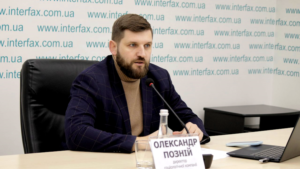
At the end of 2025, 56.2% of Ukrainians believe that the country is moving exclusively or predominantly in the right direction, while 30.6% assess this movement as wrong, according to the results of a nationwide sociological survey by Active Group, presented at a press conference at Interfax-Ukraine on Monday.
According to the published data, among Ukraine’s main achievements since the start of the full-scale invasion, respondents most often cited the attraction of international aid (61.4%). Respondents also noted the organization of the country’s defense (43.1%), the unification of society around support for defenders (32.8%), and the development of the domestic defense industry (32.6%).
At the same time, Ukrainians consider corruption to be the key internal challenge, with 79.2% of respondents naming it as the country’s main problem. Among other problems, respondents pointed to mobilization (39.7%), economic support (32.2%), and defense organization (33.7%). At the same time, 41.7% believe that the real fight against corruption has intensified, while 47.3% say it has weakened.

“Ukrainians are approaching the end of the year with a combination of cautious optimism and a demand for justice, which is why corruption remains the main internal challenge for society,” said Alexander Pozniy, director of the research company Active Group, commenting on the results of the study.
The survey also showed a high level of support for the idea of peace talks: 78.0% of Ukrainians view negotiations to end the war very or somewhat positively. At the same time, views on the terms of peace remain ambiguous. Thus, 46.5% admit the possibility of a temporary loss of certain territories during the truce, while 56.3% consider a freeze on the front line to be acceptable. The greatest resistance is caused by scenarios involving strategic concessions: 66.2% do not allow the withdrawal of Ukrainian troops from the controlled part of Donbas, and 57.6% do not agree to a complete refusal to return the occupied territories by military means. At the same time, 76.2% support the idea of deploying NATO troops in Ukraine as a security guarantee.
Regarding elections during wartime, a total of 53.7% of respondents expressed a negative attitude towards holding elections before the end of hostilities, while 33.8% viewed the idea positively.
In the simulation of the first round of the presidential election, Volodymyr Zelensky (17.8%) and Valery Zaluzhny (16.6%) received the most support, followed by Kirill Budanov (7.3%), Petro Poroshenko (6.5%), and Dmytro Razumkov (5.4%). At the same time, 18.4% of respondents were undecided, and another 15.2% said they intended not to vote or to spoil their ballot.
Modeling of the second round shows Valery Zaluzhny leading against Volodymyr Zelensky with 38.5% to 26.7%, and against Kirill Budanov with 34.6% to 28.7%. According to the survey results, the most competitive scenario for the second round appears to be between Volodymyr Zelensky and Kirill Budanov: 32.1% would support Budanov, while 29.8% would support Zelensky.
In hypothetical parliamentary elections, Valery Zaluzhny’s party leads (14.2%), ahead of Volodymyr Zelensky’s party (10.4%) and European Solidarity (9.0%). Potential party projects associated with Kirill Budanov (9.3%) also show noticeable results. The share of those who are undecided is 17.8%.
The survey was conducted by Active Group using the SunFlower Sociology online panel. The method involved self-completion of questionnaires by Ukrainian citizens aged 18+. The sample consisted of 2,000 questionnaires, representative in terms of age, gender, and region of Ukraine. The theoretical error at a confidence level of 0.95 does not exceed 2.2%. The data collection period was December 21-23, 2025.
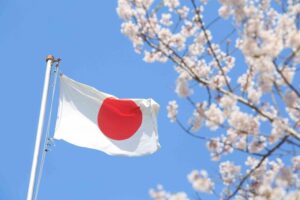
According to a survey conducted by Active Group in collaboration with Experts Club in August 2025, Ukraine has one of the most positive attitudes toward Japan among countries worldwide.
According to the study, 68.7% of Ukrainians have a positive opinion of Japan (33.0% — mostly positive, 35.7% — completely positive). Only 2.7% have a negative opinion, while 26.7% of respondents are neutral. Another 2.0% admitted that they know little about the country.
“Japan occupies a special place in the perception of Ukrainians. It is seen as an example of a country that has achieved great results through innovation, technological development, and the preservation of traditions. This level of trust can become the basis for further expansion of cooperation between our countries,” emphasized Active Group CEO Oleksandr Pozniy.
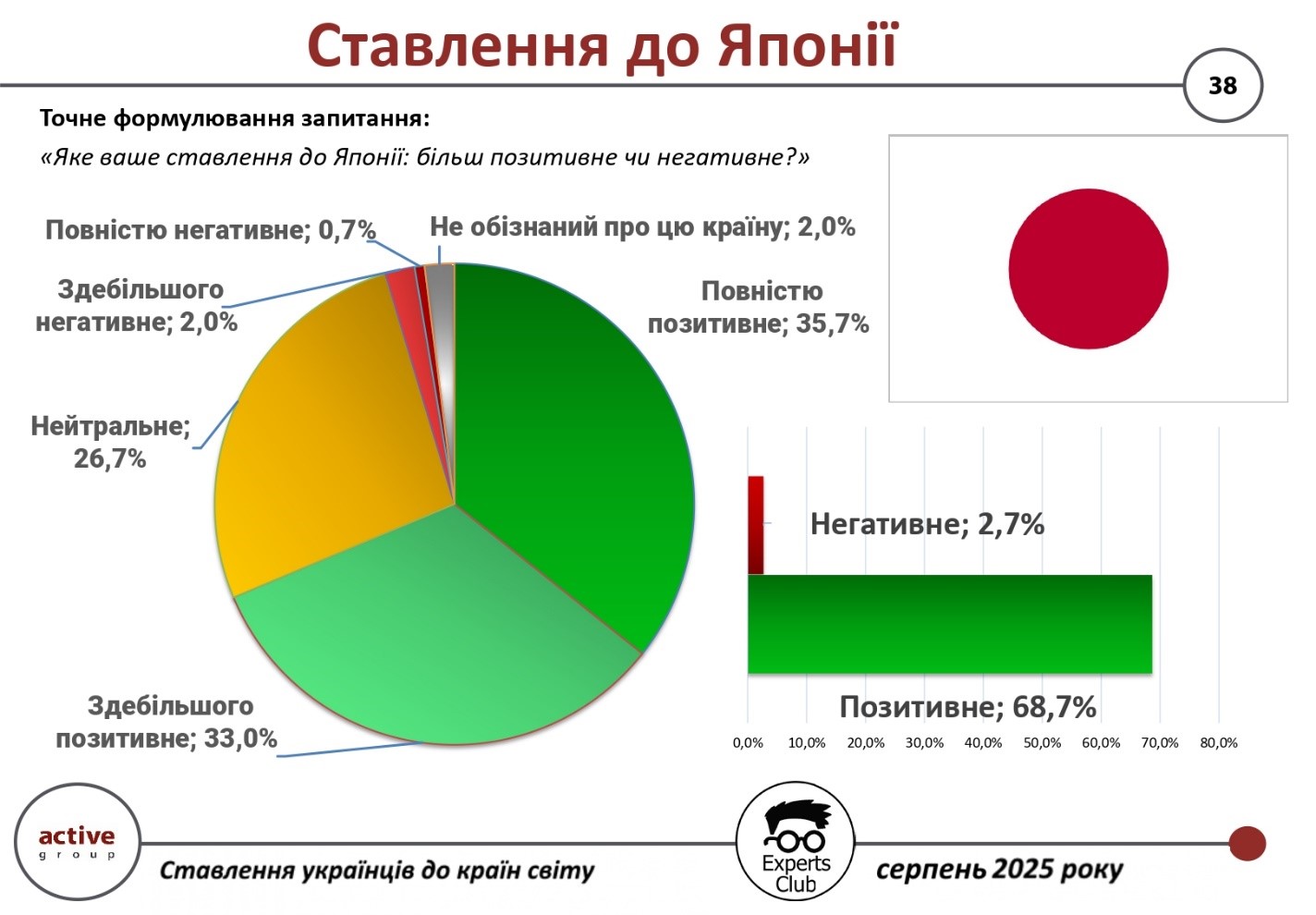
In turn, Maksim Urakin, co-founder of Experts Club, emphasized the economic dimension:
“In 2025, the total trade volume between Ukraine and Japan exceeded $521 million. At the same time, Ukrainian exports to Japan amounted to only $18 million, while imports exceeded $502 million.
This resulted in a significant negative balance of $484 million. Such an imbalance is a signal to look for new opportunities for Ukrainian goods to enter the Japanese market,” he stressed.
The study was part of regular monthly monitoring of Ukrainians’ attitudes toward key international partners.
The full video can be viewed at: https://www.youtube.com/watch?v=YgC9TPnMoMI&t
You can subscribe to the Experts Club YouTube channel here: https://www.youtube.com/@ExpertsClub
ACTIVE GROUP, EXPERTS CLUB, JAPAN, Pozniy, RELATIONS, SOCIOLOGY, TRADE, UKRAINE, URAKIN
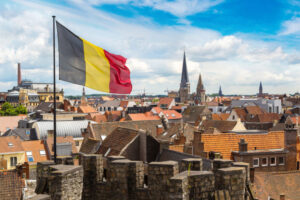
Ukrainians’ attitude towards Belgium is mostly positive, although a significant portion of respondents take a neutral position. This is evidenced by the results of a nationwide sociological survey conducted by Active Group in collaboration with Experts Club in August 2025.
According to the results, 54.7% of Ukrainians have a positive attitude towards Belgium (35.3% — mostly positive, 19.3% — completely positive). Only 2.7% of citizens expressed a negative attitude (0.3% — mostly negative, 0.3% — completely negative). At the same time, 43.0% of respondents remain neutral, and 2.3% said they do not have enough information about the country.
“Belgium is perceived by Ukrainians as an important member of the European Union and NATO, a country that consistently supports Ukraine on the international stage. At the same time, its relative remoteness and lack of deep historical ties account for the high proportion of neutral assessments,” explained Active Group founder Oleksandr Pozniy.
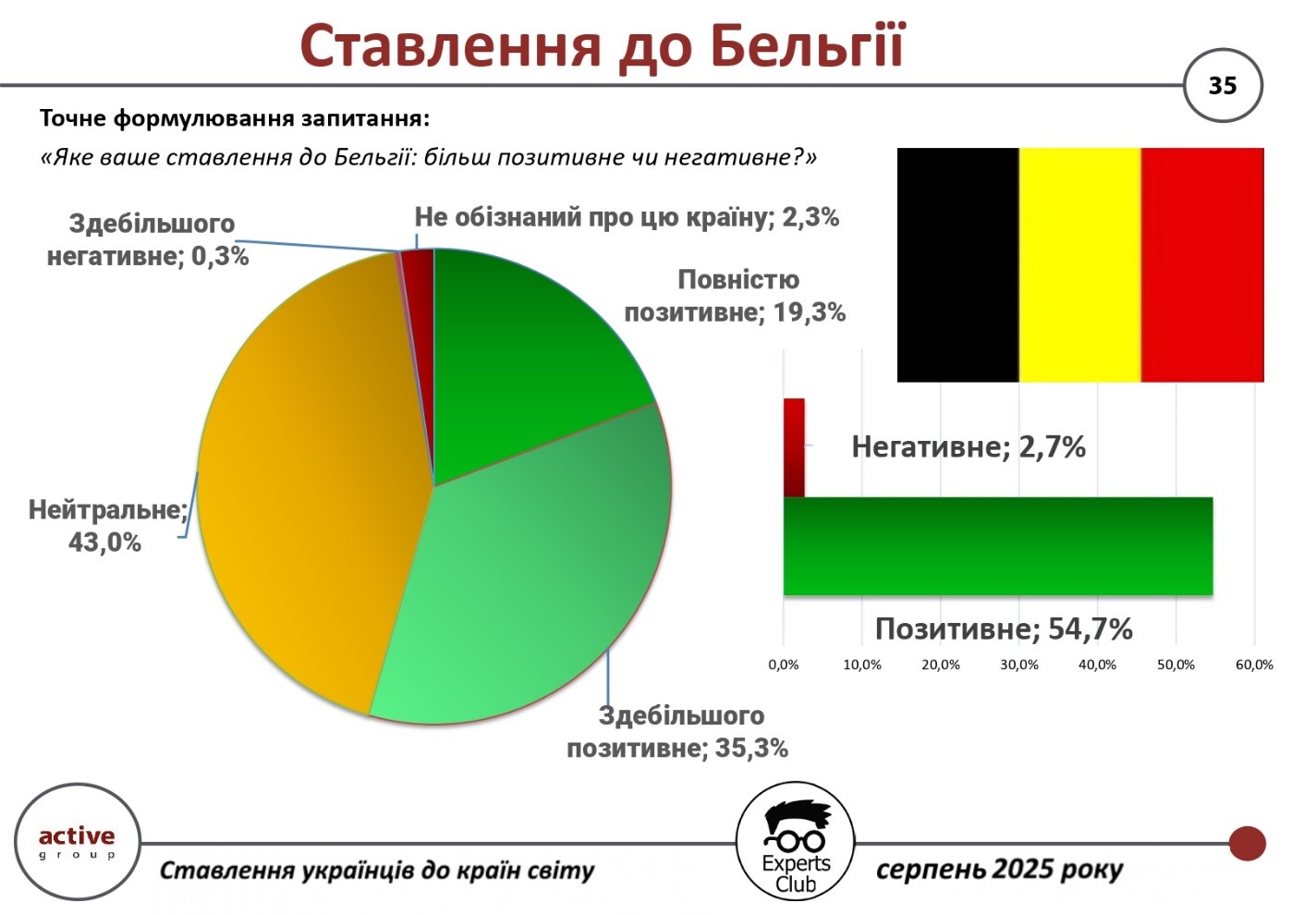
In turn, co-founder of Experts Club Maksim Urakin drew attention to the economic component of bilateral relations:
“In the first half of 2025, trade turnover between Ukraine and Belgium amounted to more than $584 million. Ukrainian exports amounted to about $235 million, while imports from Belgium exceeded $348 million. This resulted in a negative balance of $113.8 million, which highlights the Ukrainian market’s dependence on Belgian goods,” he emphasized.
The study is part of a broader project aimed at examining the international sympathies and antipathies of Ukrainians in 2025.
The full video can be viewed at: https://www.youtube.com/watch?v=YgC9TPnMoMI&t
You can subscribe to the Experts Club YouTube channel here: https://www.youtube.com/@ExpertsClub
ACTIVE GROUP, BELGIUM, DIPLOMACY, EXPERTS CLUB, Pozniy, SOCIOLOGY, TRADE, URAKIN
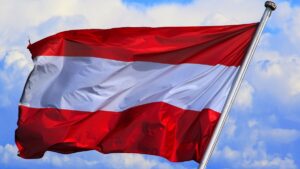
Ukrainians’ attitude towards Austria is generally positive, but a significant proportion of respondents remain neutral. These are the results of a nationwide sociological survey conducted by Active Group in cooperation with Experts Club in August 2025.
According to the survey, 48.7% of Ukrainians expressed a positive attitude towards Austria (37.0% — mostly positive, 11.7% — completely positive). Only 4.7% of citizens demonstrated a negative attitude (4.3% — mostly negative, 0.3% — completely negative). At the same time, the largest group — 44.7% of respondents — took a neutral position, while another 2.3% said they did not have enough information about the country.
“Austria is traditionally perceived by Ukrainians as a European country with high social standards, cultural heritage, and a stable political system. Although Austria is not Ukraine’s main partner in foreign policy, the overall level of sympathy remains positive,” emphasized Active Group founder Oleksandr Pozniy.
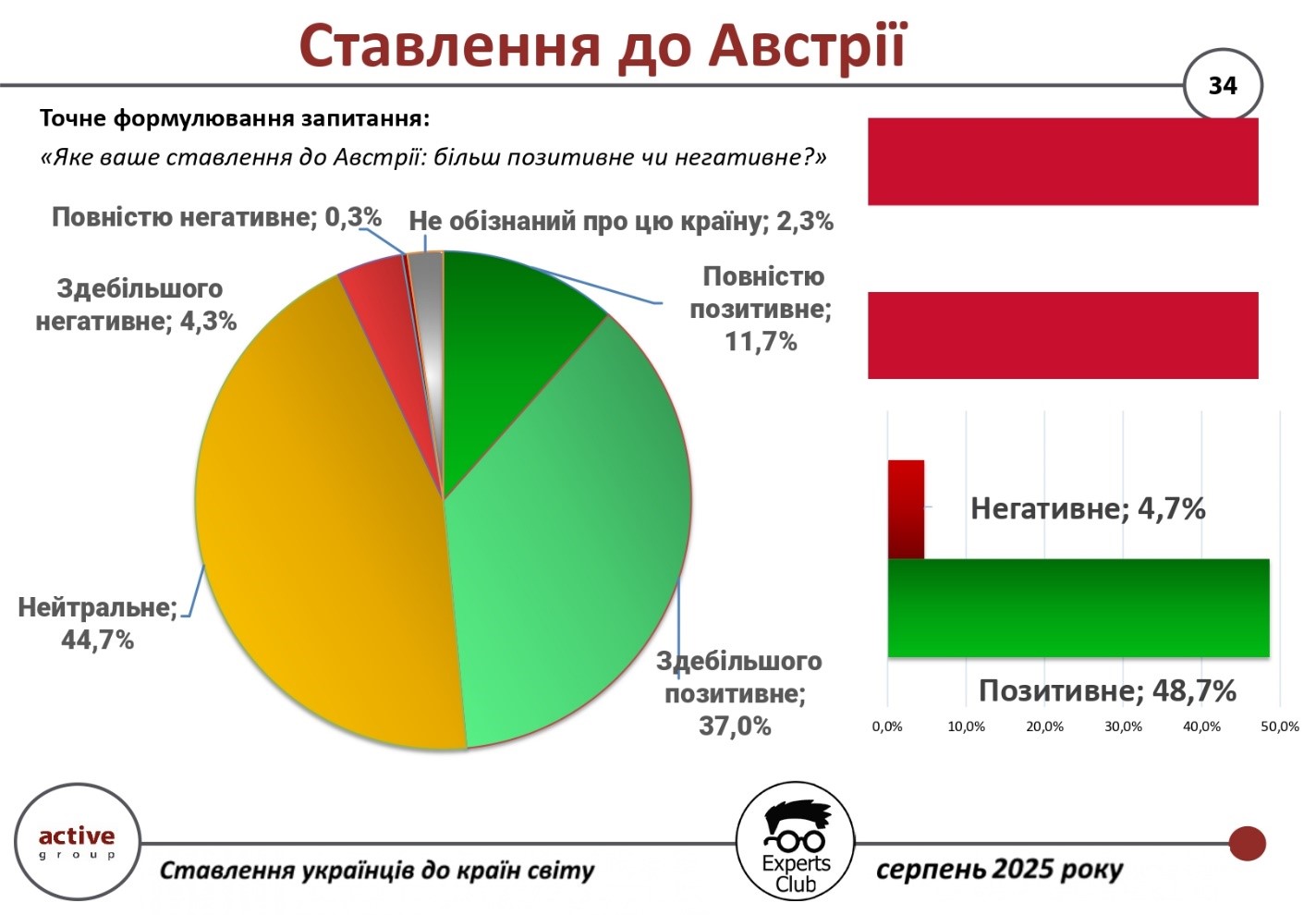
In turn, co-founder of Experts Club Maksim Urakin drew attention to the economic component:
“In January–June 2025, the total trade volume between Ukraine and Austria amounted to over $701 million. At the same time, exports of Ukrainian goods reached $276 million, while imports from Austria amounted to about $425 million. This led to a negative balance of $148.9 million, which indicates a significant advantage of Austrian exports over Ukrainian ones,” the expert emphasized.
The survey is part of a large-scale study of Ukrainians’ international sympathies and antipathies, reflecting not only political and cultural aspects, but also economic aspects of relations with various countries.
The full video can be viewed at: https://www.youtube.com/watch?v=YgC9TPnMoMI&t
You can subscribe to the Experts Club YouTube channel here: https://www.youtube.com/@ExpertsClub
ACTIVE GROUP, AUSTRIA, DIPLOMACY, EXPERTS CLUB, Pozniy, SOCIOLOGY, TRADE, URAKIN
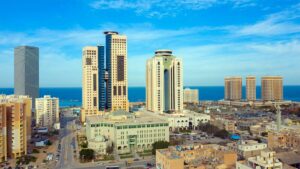
Ukrainians have a predominantly neutral attitude towards Libya, although the level of negative assessments is higher than for most other North African countries. This is evidenced by the results of a survey conducted by Active Group in partnership with Experts Club.
According to the data, 9.3% of respondents expressed a positive attitude toward Libya (6% — mostly positive, 3.3% — completely positive). A negative attitude was expressed by 14.3% of respondents (11.7% — mostly negative, 2.7% — completely negative). The majority of Ukrainians — 69.7% — took a neutral position, while another 6.7% said they did not have enough information.
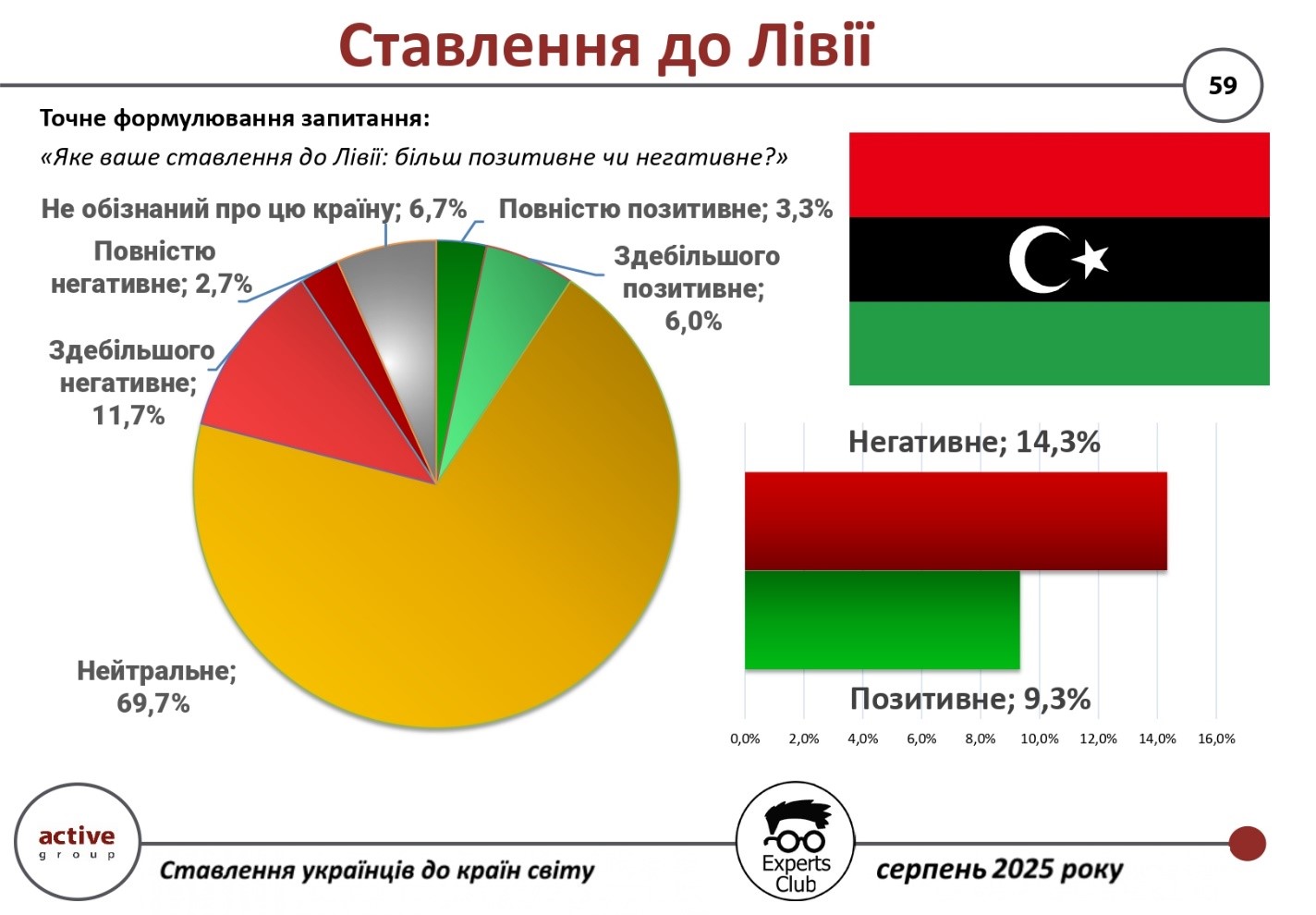
In 2024, trade turnover between Ukraine and Libya amounted to $149.7 million, of which exports accounted for $141.7 million and imports for $8.1 million. The positive balance was $133.6 million.
“Libya remains a traditional market for Ukrainian agricultural products, but political instability in that country affects both trade dynamics and perceptions among Ukrainians. The high level of neutrality indicates a lack of knowledge, as well as the absence of stable humanitarian and cultural ties,” commented economist and founder of Experts Club Maksim Urakin.
The full video can be viewed at: https://www.youtube.com/watch?v=YgC9TPnMoMI&t
You can subscribe to the Experts Club YouTube channel here: https://www.youtube.com/@ExpertsClub
ACTIVE GROUP, EXPERTS CLUB, Livia, Pozniy, SOCIOLOGY, TRADE, UKRAINE, URAKIN